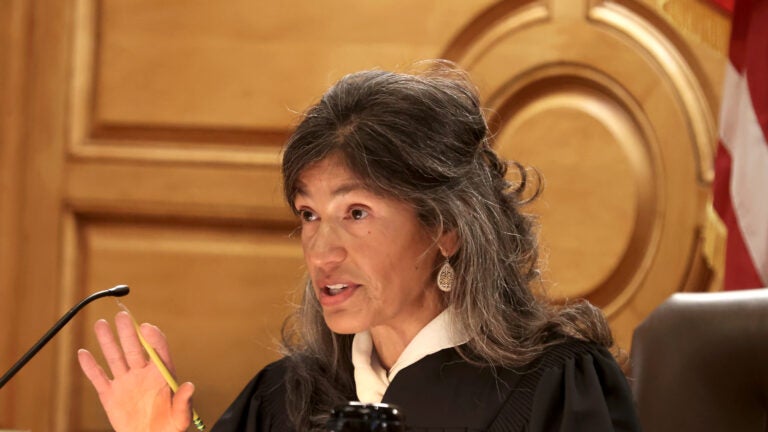Local News
Bar advocates, who provide representation for most of the state’s indigent defendants, stopped work in May to fight for higher wages.

Hundreds of cases against unrepresented people facing criminal charges in Suffolk and Middlesex counties might be dropped by the end of the month due to an ongoing work stoppage by public defenders, the Supreme Judicial Court ruled Thursday.
Most of the constitutionally required representation for defendants who cannot afford their own in Massachusetts is provided by bar advocates, who are not state employees but private attorneys. In May, bar advocates stopped taking on indigent cases to fight for higher hourly wages, which are set by the legislature.
In a 25-page order filed Thursday invoking an emergency protocol, Associate Justice Dalila Argaez Wendlandt ordered judges to release unrepresented defendants who have been in custody for more than seven days. Judges can also dismiss the case against a defendant who has been facing a felony, misdemeanor, municipal ordinance violation charge for more than 45 days without counsel.
About 271 defendants in Middlesex County, Chelsea District Court, and the Boston Municipal Court are unrepresented and will have had their cases pending for at least 45 days by July 25, according to Wendlandt’s order. At least 30 people in those courts have been held in custody for longer than a week without representation, according to the decision.
The Committee for Public Counsel Services, or CPCS, filed the case against prosecutors on behalf of the unrepresented indigent criminal defendants in June. It asked the courts to impose the Lavallee protocol, a 2004 precedent that sets the seven- and 45-day deadlines. CPCS, which organizes bar advocates, also asked for increased compensation for attorneys.
In Massachusetts, bar advocates make $65 an hour, their latest raise in 2022. This is the lowest rate among neighboring states, some of which offer more than twice the Massachusetts rate. In her order, Wendlandt declined to use her power to change the rates of compensation without prejudice, meaning CPCS can ask again at a later date.
Wendlandt found that the current number of defendants in the counties “far exceed” the amount needed to apply the Lavallee protocol.
“This judicial intervention is a vital safeguard for the rights of individuals who are facing prosecution without the benefit of legal counsel,” CPCS Chief Counsel Anthony Benedetti said in a statement. “But make no mistake: the Lavallee protocol is a temporary measure. It does not address the root cause of the crisis – an insufficient number of private Attorneys willing to take cases at the current hourly rates. Until this issue is resolved, clients will continue to go without representation.”
Lawyers, advocates want ‘swift’ resolution, but court sees none
Suffolk County District Attorney Kevin Hayden, whose jurisdiction includes BMC and Chelsea District Court, reacted to the decision.
“Our primary interests are victim rights and public safety, and the constitutional rights of indigent defendants to legal counsel,” his statement said. “We hope for resolution with structural changes that ensure this situation will not occur again.”
Leaders with the Prisoners’ Legal Services of Massachusetts said in a statement that “representation in a criminal offence is a constitutional right, and no one should be detained without effective assistance of counsel.”
“Even with the emergency protocols in place, the deprivation of liberty some defendants are facing are not trivial — seven days in a jail without an attorney is enough to threaten many peoples’ jobs, especially for the population that can’t pay for their own attorney, and 45 days without an attorney threatens spaces in housing programs and other similar essential benefits,” Executive Director Dave Rini said. “We hope for a swift, equitable resolution here.”
In her decision, Wendlandt noted that shortage of bar advocates “will likely continue for the foreseeable future” due to increasing populations of unrepresented indigent defendants and no set end to the work stoppage.
“There do not appear to be any concrete present prospects for remedying the problem, which is ultimately caused by the rates of pay set for bar advocates,” Wendlandt noted when identifying the “prospects of remedying the problem.”
CPCS’s Benedetti said that “we believe the Legislature recognizes that this is not sustainable,” referring to attorneys unwilling to take cases at the current hourly rate of $65.
“CPCS will continue to do everything in our power to meet our mandate: To ensure that every person accused of a crime and unable to afford a lawyer receives the zealous and effective representation they are guaranteed under the law,” Benedetti said.
Sign up for the Today newsletter
Get everything you need to know to start your day, delivered right to your inbox every morning.
(Except for the headline, this story has not been edited by PostX News and is published from a syndicated feed.)

